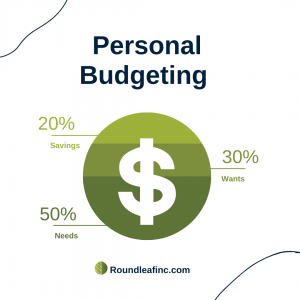Personal Budgeting 50/30/20 Rule

Personal budgeting may not sound all that exciting, but it can keep financial balance in your household.
Creating a personal budget will help you gain control of your spending habits. Not only can a personal financial budget allow you to focus on things that matter most, but it also paves the way to financial freedom.
What is a personal budget?

Personal budgeting allows you to compare your current spending habits and expenses with your net worth and live within your means. Utilizing a financial plan through a budget will help you save money and get rid of unwanted debt.
Who should use personal budgeting?
Anyone can use the personal budgeting method to track their monthly expenses. If you are looking for financial freedom, need to pay off a student loan, save for a trip or retirement, budgeting your expenses, and having a savings plan will help achieve this. Creating a budget is the first step to good financial planning.
How to create a financial budget?
Managing your money can be tricky. But organizing your monthly bills with a household budget is critical if you want to stay on top of your finances. When you are unorganized it is easy to miss important details in your spending habits.
One simple way to stay organized is to use a budget calendar to write each bill down on the day it is due. Having a visual aid or budget spreadsheet serves as a reminder and helps lessen the chance of overdue bills and late charges.
To make a budgeting plan, create a list of all of your monthly expenses.
Include fixed expenses and bills such as:
- Rent or mortgage
- Property and car insurance
- Car payments
- Transportation costs
- Utility bills
- Credit card debt and payments
- Medical bills
- Childcare expenses
- Groceries
- Entertainment
- Personal care for everyone in the household
Don’t forget to add variable or discretionary expenses. Remember some months you will need to add in additional irregular expenses such as car maintenance, birthdays, holidays, and even back-to-school needs if you have children.
The point is to be prepared for all expenditures and living expenses that you know will be coming up, set a budget, and plan for them, so there are no unplanned expenses or surprises.
Be sure to adjust your household budget each month as things change. Try to make an emergency fund where you can put back savings throughout the year. When you don’t have a plan or enough money, it can be stressful when you encounter unexpected expenses. Stressing over money takes the fun out of giving and celebrating.
Once you have all your expenditures listed, you will make a list of all your discretionary income.
50/30/20 Method
The rule of thumb for budgeting is to divide up the income after tax and use the 50/30/20 method.
- 50% on your bills
- 30% on things you want
- 20% allotted to savings

50% Needs
50% of your income should be tailored to your needs. This can include anything you need daily,
- Housing
- Gas
- Groceries
- Basic Utilities
- Car payments
- Any loan payments
This percentage is a typical amount for most people. However, if your needs include more than 50 % of your income you may need to take away from the 30% of your wants. Sometimes things change every month so it is important to revisit your budget method every month.
30% Wants
30% of your income is used for things you want. This can include anything you want but don’t need daily,
- Pedicures
- Shopping sprees
- Going out to restaurants
- Taking a vacation
- Going out to the movies
This portion of your income may not allow you to spend on things you want each month. It can be seen as more of a want fund. You may also put this towards your needs if you need to pay off debt faster.
20% Savings
20% of your income should go straight to your savings account. This allows you to plan for any unexpected expenses or emergencies. Having a specific percentage planned out helps you stay on top of your financial plan.
However, many people are living paycheck to paycheck and cannot always allocate these percentages. Many of us will need to adjust the percentages until the outstanding debt is cleared or our financial situation improves.
This method can be a starting point for future budget planning and goals. A personal budget will only work if you are honest about your income and expenses.
What is a personal cash budget?
A cash budget is important for personal financial growth. Having a personal cash budget enables you to only spend what you have on hand and lessens the temptation to use a debit or credit card for unnecessary purchases.
Having a personal budget is like paying yourself an income. When you add yourself as a bill on your budget worksheet, it can counteract impulse spending since the amount of cash you have on hand is limited.
This personal finance budget usually includes entertainment and self-care, such as movies, gym memberships, and hygiene needs. This allows you to feel like you have free spending money and helps you stay within your monthly budget.
How to maintain a monthly budget with an irregular income?
There are a few different ways to pay bills with an irregular income. The most common way is to make your debt payments with a credit card. However, this is ONLY advised if you will have enough money to pay it off in the same billing cycle.
Your financial goal should be to get ahead and using credit cards can put you behind if not used properly. If you get paid once a month, adjust your budget each month to account for your monthly income and overspending. You should allow for shortfalls or over expenditures if you only have one income a month.
You can also split payments up for each week in a separate account, so you will still have cash on hand when you need it to pay bills that come due periodically throughout the month. If you overestimate or underestimate your expenses, budgeting for unplanned expenses will help.
Personal budgeting will increase your cash flow, help eliminate unnecessary expenses and control your spending habits. Having a spending plan and a budget to stick to each month will move you towards your financial goals.
Start budgeting today with expert advice!
If you have tried making a budget on your own and were not successful at clearing off your past debt, you may need some extra help. For a more detailed budgeting step-by-step guide click here!
Using an experienced company like Roundleaf for your budgeting and financial goal planning will help you eliminate the stress of figuring it out on your own. We would love the opportunity to help you with not only your savings goal but also raising your credit score and helping you with your financial success.
Similar Readings:
- What is Capital Preservation & How It Works For You
- 5 Bad Money Habits That Can Lead To Financial Uncertainty
- Steps to Writing a Personal Budget for Financial Planning
